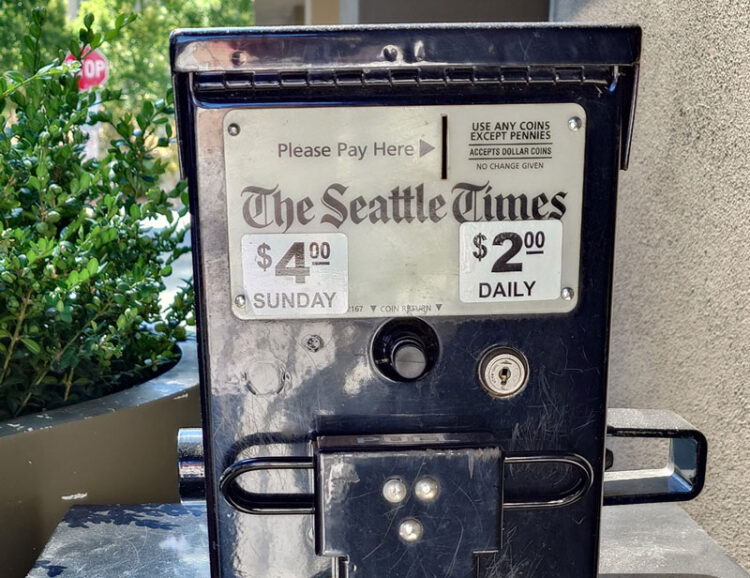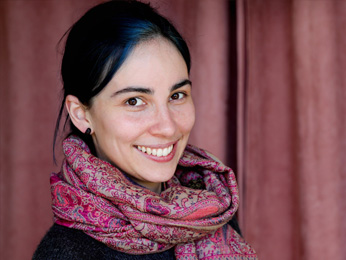
Im Rahmen der FJUM Summer School in Solutions Journalism mit Lauren Kessler an der University of Washington in Seattle habe ich gemeinsam mit meinen österreichischen Journo-Kolleg_innen Anfang August die Redaktion der Seattle Times besucht. Daraus ergab sich die Chance, an einem Gast-Kommentar mitzuwirken, in dem wir unsere Erfahrungen als Kurzzeit-College-Studis in den USA teilen: 5 European visitors weigh in on the American college experience.
Ich fühlte mich an der UW in sehr vielen Aspekten kaum ernstgenommen, und war völlig entsetzt über die Kommodifizierung (und extrem hohen Preise) von ALLEM. Das spiegelt sich auch in meinem Text wider, den ich wegen der Seattle-Times-Paywall jetzt einfach mal hierher kopiere:
Adulting
A microwave, a tiny fridge and an even smaller freezer. That’s what’s available for me to prepare food in my dorm at the University of Washington. Yes, I could cross the street and have breakfast, lunch and dinner served at the dining hall, but like so much else in this city, this comes with a hefty price tag. When I learned that students in dorms are actually required to buy a dining plan — which starts at $1,195 a quarter for the upcoming academic year — I was shocked.
Seattle Times, am 16.08.24 online und kurz darauf im print
I was shocked not only because I’m a food journalist back home in Austria, disproportionally invested in the topic, and this is just SO much money. But also because this arrangement allows for so little autonomy, or dare I say adulting, in daily life. How are you supposed to learn to stock your pantry, cook basic dishes or eat healthy on a budget if you don’t have the opportunity to do so? Given that the UW website teaches how to clean my bathroom with a video tutorial, I’m apparently also expected to never have touched a mop or rag before. And browsing through the “college” sections of local stores makes me wonder whether undergrads are secretly perceived as kindergartners. Why else would every single cup and dish be made of break-proof plastic? Countless details give me the impression that students here are kept in some sort of parallel world on campus, a costly limbo between adolescence and adulthood.
tl;dr: Bin ich froh, in Mitteleuropa zu leben!
Die Leser_innenkommentare unter dem Artikel finde ich btw auch ziemlich aufschlussreich:
All of this is legitimate criticism of U.S. higher education. Especially the part where we stopped treating adults like adults because they are college students
Narrative News
And yet for some strange reason, American colleges are the envy of the world and everyone wants to come study here. How many European colleges have produced world-leading CEOs and companies? How many European schools have spun out world-leading startups with breakthrough technologies?
AwayWithYouNow
oh…. right.
Taxes pay for things. And our universities are now 4 year summer camps with ever increasing wants from students – super nice dorms, gymns, help for this, that or the other thing, clubs, ….
Logan RunS
European universities could not care less if you come to class, pass or fail, if you need accommodation or else. It’s a lot more like school in old buildings with very large classes. But it’s free.
UW as a „public“ school gets close to no money anymore from the WA state budget.
Just WOW… again I say WOW! We’re totally blowing it in America.
user15524392783885
Yer missing the point…nothing is free in Austria…higher taxes pays for it..
avidfootballfan
Und wer jetzt immer noch Lust hat, mehr über das US-Hochschulsystem zu lesen, dem/der empfehle ich Anne Helen Petersen’s Texte (z.B. Ten Years Out of Academia, Culture Study Meets Bama RushTok, welcome the covid influencer) und Knowledge for Sale: The Neoliberal Takeover of Higher Education von Lawrence Busch.

 Hi, ich bin Jana. Seit 2009 veröffentliche ich hier wöchentlich Rezepte, Reiseberichte, Restaurantempfehlungen (meistens in Wien), Linktipps und alles, was ich sonst noch spannend finde. Ich arbeite als Redakteurin bei futurezone.at, als freie Audio-/Kulinarikjournalistin und Sketchnoterin. Lies mehr über mich und die Zuckerbäckerei auf der
Hi, ich bin Jana. Seit 2009 veröffentliche ich hier wöchentlich Rezepte, Reiseberichte, Restaurantempfehlungen (meistens in Wien), Linktipps und alles, was ich sonst noch spannend finde. Ich arbeite als Redakteurin bei futurezone.at, als freie Audio-/Kulinarikjournalistin und Sketchnoterin. Lies mehr über mich und die Zuckerbäckerei auf der 

 Über den Tellerrand
Über den Tellerrand Bücher
Bücher Zuckersüß
Zuckersüß